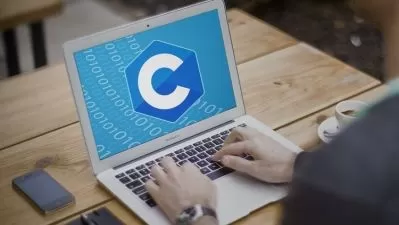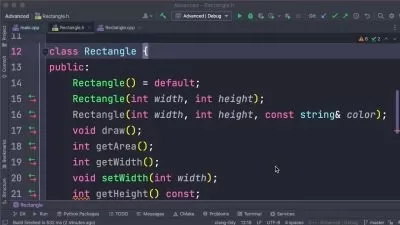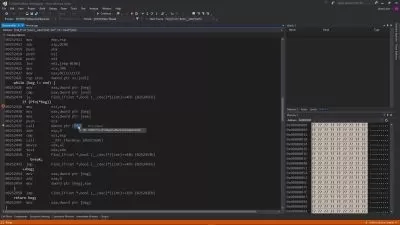C Bootcamp : Basic to Advanced
Vivek Berry
20:15:25
Description
C Bootcamp Basic to Advanced
What You'll Learn?
- You will become expert in C programming.
- This course has 20 hours of content.
- There is not risk at all ,you just need internet connection.
- After completing this course you will become an experienced programmer.
Who is this for?
What You Need to Know?
More details
DescriptionC language Tutorial with programming approach for beginners and professionals, helps you to understand
the C language tutorial easily.
Our C tutorial explains each topic with programs.
The C language is developed by Dennis Ritchie for creating system applications that directly interact
with the hardware devices such as drivers ,kernels ,etc.
C programming is considered as the base for other programming languages, that is why
it is known as mother language.
It can be defined by following ways :
1. Mother Language
2. System programming language
3. Procedure-oriented programming Language
4. Structured programming language
5. Mid- level programming language.Â
This course has more than 130 examples to understand C Language in depth.
We have 30 sections in this course , which will help you to understand C programming with ease and fun way.
We released Python course in past year ,which become the huge success .
It is a beginner friendly course also for newbie who don't know the programming at all.
This course includes C basics, variables , constants , print , scan , data types , input and output,
operators , control statements , functions , arrays , strings ,pointers , user-defined data types
, storage classes ,enumeration and many more.
C language is considered as mother language of all modern programming languages because
most of compilers , JVMs, kernels etc. are written in C language , and most of the programming languages follow
C syntax , for example , C++ ,Java , C#, etc.
It provides core concepts like array ,strings , functions etc. that are being used in many
languages  like C++, JAVA , C#, etc.
Who this course is for:
- for beginners , intermediate and professionals.
C language Tutorial with programming approach for beginners and professionals, helps you to understand
the C language tutorial easily.
Our C tutorial explains each topic with programs.
The C language is developed by Dennis Ritchie for creating system applications that directly interact
with the hardware devices such as drivers ,kernels ,etc.
C programming is considered as the base for other programming languages, that is why
it is known as mother language.
It can be defined by following ways :
1. Mother Language
2. System programming language
3. Procedure-oriented programming Language
4. Structured programming language
5. Mid- level programming language.Â
This course has more than 130 examples to understand C Language in depth.
We have 30 sections in this course , which will help you to understand C programming with ease and fun way.
We released Python course in past year ,which become the huge success .
It is a beginner friendly course also for newbie who don't know the programming at all.
This course includes C basics, variables , constants , print , scan , data types , input and output,
operators , control statements , functions , arrays , strings ,pointers , user-defined data types
, storage classes ,enumeration and many more.
C language is considered as mother language of all modern programming languages because
most of compilers , JVMs, kernels etc. are written in C language , and most of the programming languages follow
C syntax , for example , C++ ,Java , C#, etc.
It provides core concepts like array ,strings , functions etc. that are being used in many
languages  like C++, JAVA , C#, etc.
Who this course is for:
- for beginners , intermediate and professionals.
User Reviews
Rating
Vivek Berry
Instructor's Courses
Udemy
View courses Udemy- language english
- Training sessions 144
- duration 20:15:25
- Release Date 2024/04/27










